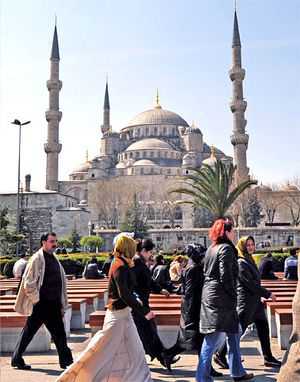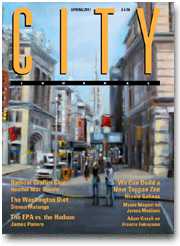AN OFFICIAL REPORT FROM:
AMERICAN FOREIGN POLICY COUNCIL
Anatomy Of A Power Struggle
By Claire Berlinski
The Journal of International Security Affairs
December 19, 2012
While Turkish Prime Minister Recep Tayyip Erdogan needs no introduction, the Turkish imam Fethullah Gülen is probably the most important person you’ve never heard about. He is an immensely powerful figure in Turkey, and—to put it mildly—a controversial one. He is also an increasingly powerful figure globally. Today, there are between three and six million Gülen followers. Gülen leads the cemaat, an Islamic civil society movement, that has until now been critical to the electoral success of Erdogan’s Justice and Development Party (AKP). The cemaat is often described as Turkey’s Third Force—the other two being the AKP and the military.
Gülen has been living in the Poconos since March 1999. Shortly after he decamped to the United States, ostensibly for medical treatment, Turkish television broadcast footage of the imam instructing his followers to infiltrate the organs of the state. He was prosecuted in absentia for seeking to overthrow the Turkish constitution. The charges were dismissed in 2008, so there is no longer any legal obstacle preventing him from returning to Turkey. But he remains in the United States where, among other things, he is a large player in the U.S. charter school business.
Although the movement purports to be structured informally, this is generally not the view of scholars who are not on its payroll, or of those who have left its ranks. Almost uniformly, they observe that the movement’s organizational structure is strict, hierarchical, and undemocratic. So are its tenets. Gülenists assiduously cultivate the image of Gülen and his movement as tolerant, peace-loving, and modern. Gülen indeed sponsors lavish interfaith dialogue events, while his schools, cultural centers, conferences, newspapers, and television stations are the more important platform for the promotion of his agenda, which is decidedly less tolerant and modern. Gülen, for example, has expressed the belief that the penalty for apostasy should be death—if the transgressor fails to return to the Islamic fold by more peaceful means.
Gülen says he does not wish to be involved in politics, but has nonetheless—until recently—used his influence, and particularly his vast media empire, to promote the AKP. This alliance was logical: Gülen and the AKP shared important goals, such as promoting a larger role for religion in Turkey and a smaller role for the military. The AKP and Gülen also shared a vision of expanding Turkish influence abroad, particularly in the territories of the former Ottoman Empire. The movement has been instrumental in promoting Turkish business interests in the Middle East, North Africa and sub-Saharan Africa.
However, the AKP and the Gülen movement are by no means identical. Indeed, while a number of AKP MPs are followers of Gülen, Erdogan is not. Gülen and his followers can best be described as political opportunists; when the military removed Refah Party Prime Minister Necmettin Erbakan from power in 1996, Gülen positioned himself with the military. Later, his loyalties shifted to the AKP, which was an outgrowth of Refah. Generally, Gülen seeks to attach himself to power, cooperate with it, and use it to his advantage.
The AKP and the cemaat for a time found each other extremely useful. The cemaat’s assiduous penetration of the police and the judiciary allowed Erdogan to confront the military and other key obstacles to the enlargement of his power; cemaat-controlled media organs generated public support for this. Erdogan was content to use the prosecution of suspected coup plotters (collectively referred to as the “Ergenekon” conspiracy) to purge his own enemies. But now that the government, with Gülen’s help, has largely demoralized the military, confined its most serious ideological opponents to prison, and terrified the rest into silence, the inevitable is happening. The victors are fighting over the spoils.
Tensions began to rise over the “Ergenekon” investigations, which have grown increasingly embarrassing for the AKP. Hundreds of serving and retired military officers, including former Chief of General Staff Ilker Basbug, have been jailed, along with elected MPs and prominent academics. The arrests of journalists in particular have given rise to tremendous criticism, prompting Erdogan to dismiss the case’s lead prosecutor, Zekeriya Öz, the Gülenist mastermind of the “Ergenekon” probe. Still, while Erdogan appeared to be discomfited by this, he was willing to accept it; if a bit of embarrassment was the price he had to pay for getting rid of his enemies, so be it.
But then, the cemaat began going after Erdogan’s friends. His trusted intelligence chief, Hakan Fidan, is seen by the cemaat as soft—soft on Iran, but more importantly, soft on the Kurdish Worker’s Party (PKK). The cemaat is intensely hostile to the leftist (indeed, neo-Maoist) PKK, and when the news broke last year that Fidan had entered into secret negotiations with the group, it was apparently too much for Gülen to bear. The tension finally broke into the open.
On February 7, special prosecutor Sadrettin Sarıkaya, who had been investigating the KCK, the alleged urban branch of the PKK, ordered the detention of Fidan, Fidan’s predecessor Emre Taner, and two others. Erdogan took the maneuver as a direct assault on his authority. Within days, the AKP drafted a new law making it impossible for the Justice Department to prosecute employees of MIT (Milli Istihbarat Teskilatı, or National Intelligence Organization) without the prime minister’s consent. The Gülen movement was enraged; a furious backlash ensued in the Gülenist press, which ran articles lambasting the party as authoritarian and accusing it of endangering Turkish democracy.
For newspapers that had spent years applauding Erdogan and the AKP and relentlessly supporting his ever-increasing authoritarianism, this was a remarkable reversal. The fight, however, was not just about Fidan. It was also about Erdogan’s increasing discomfort with Gülen’s control over the judiciary and police, and the growing political cost of the sprawling investigations launched by the special authority courts.
Much to the Gülenists’ dismay, Erdogan was not chastened by their maneuvers. To the contrary, he was enraged. With a speed that astonished observers, the government removed Sarıkaya from the MIT case. The General Directorate for Security dismissed nine officials in the Istanbul police department who had been working in a KCK operations unit. Two other high-ranking police officials were also removed, and for good measure the chief prosecutors for various cases were reassigned to different posts. The message was perfectly clear: Erdogan, not Gülen, controlled Turkey. To make sure no one misunderstood, Justice Minister Sadullah Ergin gave the Supreme Board of Judges and Prosecutors permission to begin an investigation into Sarıkaya on suspicion of violating the secrecy of the prosecution and abusing his power. To establish that no one misunderstood, 700 Istanbul police officers working in departments related to intelligence, terrorism, and organized crime in the Istanbul Emniyet were reassigned to the southeast.
The next stage in the growing power struggle involved, of all things, soccer. The July 2011 arrest of Aziz Yildirim, the president of the Fenerbahçe sport club, on charges of match-fixing was of course about much more than European football; Yildirim is a major defense contractor for NATO. With him out of the way, many lucrative jobs could go to Gülen’s star entrepreneur, Ahmet Çalık.
But the attack on Yildirim proved a serious misjudgment. The importance of football in Turkey cannot be underestimated (or understood, so don’t try). Fenerbahçe fans were enraged by Yildirim’s arrest. They took to the streets in massive numbers repeatedly, and were repeatedly tear-gassed; the videos of fans, many of them women, some even in headscarves, and children, being gassed by Gülenist “robocops” in full battle regalia circulated all over Facebook and Twitter.
The AKP’s fear of a massive loss of votes if immensely popular footballers were to end up in prison for many years, prompted the party to propose limiting the maximum penalty for the crimes with which they were charged. Then, while Erdogan was in the hospital, President Abdullah Gül (who is known for having better relations with the Gülen movement) vetoed the bill. It was the first time in his four-year presidency that Gül had done so, and it was not at all a coincidence that this happened when Erdogan was in the hospital, being treated, or so his doctors said, for intestinal polyps. (The rumors that in fact he has colon cancer were and remain persistent, and they were obviously taken seriously by many of his supporters in the AKP, who believed it might be wise to throw in their lot with the Gülenists.) When Erdogan emerged from the hospital looking, at the very least, alive, parliament overrode the veto. Erdogan won the round, but the divide with the Gülenists was now impossible to ignore.
The final straw was the prime minister’s attempt to abolish the special authority courts—which left the Gülenists positively hysterical. Hüseyin Gülerce, Gülen’s mouthpiece in Turkey, wrote columns with such striking rage and paranoia about these proposals that they would no doubt have been fodder for satirists were Turkish satirists not all too aware of what happens to their ilk. The move to abolish the courts followed the arrest of former Commander-in-Chief Ilker Basbug. This prompted Erdogan to say he was “disturbed” by the unending raids against current and former military officers, and to urge the prosecution to get their investigation “over and done with.”
Outsiders might not notice that something has gone terribly wrong between Erdogan and Gülen. Neither has anything to gain from a visible power struggle. According to AKP MP (and former Erdogan advisor) Yalçın Akdogan, the impression of a conflict with the Gülen movement has been intentionally exaggerated; it is certainly true that opponents of both Erdogan and Gülen are greatly enjoying the discord. In June, Erdogan publicly invited Gülen to return to Turkey; two days later, Gülen declined, weeping (as he often does) as he expressed his fears that his return might damage his movement’s achievements. Erdogan’s invitation to Gülen was interpreted by some as a peace offering, but it was far from one. Erdogan simply had called Gülen’s bluff and cloaked it in a guise of magnanimity. It was a political master stroke.
Erdogan is now endeavoring to shore up the support of the conservative wing of his party, proffering political favors to politicians capable of helping him erect an anti-Gülen alliance. Meanwhile, rumor has it that the Gülenists are considering putting their weight behind the more sympathetic Abdullah Gül as their politician of choice (one who recently signaled that he might run for another presidential term). Should he do so, it will end Erdogan’s vision of an easy ascent to a presidency with enhanced powers, and in all likelihood engender a split in the AKP.
The rivalry may have healthy consequences. The Gülen media is finally covering stories that should have long ago been covered in a society with a vibrant opposition press. The pressure to eliminate the courts with special authority was long overdue. (Sadly, it has not resulted in the release of most of those arrested.) But it could also result in a race to the bottom, with both camps striving to blackmail, jail, and intimidate members of the other, while simultaneously attempting to position themselves as the more authentic defenders of Turkish nationalism and Islam—neither of which are ideologies known to give rise, historically, to anything we would recognize as a liberal democracy.
Claire Berlinski is the American Foreign Policy Council’s Senior Fellow for Turkey, based in Istanbul. She is the author of There Is No Alternative: Why Margaret Thatcher Matters (Basic Books, 2011), and of Menace in Europe: Why the Continent’s Crisis is America’s, Too (Crown Forum, 2006).





